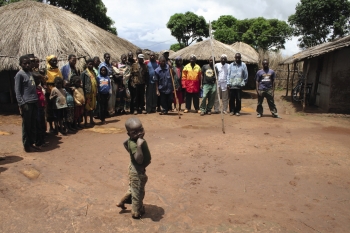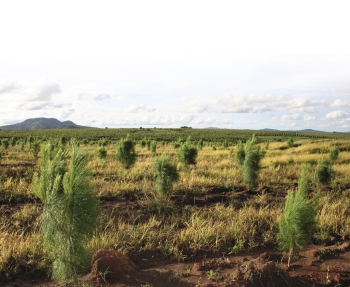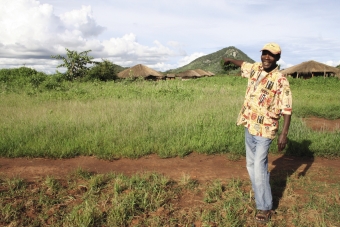Standing Up To The ‘Land Grabbing' Foresters In Mozambique
By Hazel Healy
21 May 2013
New Internationalist
Forestry companies want to carve up Mozambique 's northern highlands. Peasants and their allies are working to hold them accountable. Following is an investigation
The highland plateau of Mozambique's remote northern Niassa province serves up dramatic skies, in endless configurations, as you drive north out of the provincial capital Lichinga.
If you stay on this road, it takes you all the way to Tanzania . Red-brick thatched houses – the color of the earth – cluster along the edge. Translucent bags of sunflower oil hang outside for sale, glistening from bamboo sticks. A pair of soaked cyclists trundle by, loaded down with sacks of charcoal. The heavy rains are petering out; maize, bananas and a first crop of beans will soon be ready for harvest. But until then, these are the hunger months, January to March, when farmers give children more water to drink, and have to buy back food at twice the price they sold it for at harvest time. Here 45 per cent of children under five are malnourished.

Villagers gather in Cazizi where the company Chikweti Forests has encroached on their lands. Hazel Healy
Mixed in between the sunflowers, you can see the tips of pine trees, peering over the rim of settlements. And then, plots of pine and eucalyptus, which alternate with the standing maize. These clumps of fast-growing, exotic trees belong to the forest entrepreneurs. Six companies are fighting to get a foothold; the biggest investor is Chikweti Forests of Niassa. Funded by mostly Scandinavian but also European and US capital, they have grand plans. Together, they have planted around 32,000 hectares on 50-year leases, but aim for close to 600,000. If they succeed, Niassa will become home to the largest expanse of industrial forestry in Africa . A company PowerPoint presentation optimistically predicts tens of thousands of jobs and 22 trucks thundering along this road every hour, come 2035.
Forestry accounts for 70 percent of land deals in Mozambique , and half of these are in Niassa. It's experiencing something of a boom – saw milling, pulp, fibreboard and carbon offsetting schemes offer a panopoly of future income streams. But while the story goes that there is space for everyone in this under-developed province, plantation forests have caused direct conflict with local communities over land.
Empty land?
Niassa has form in the narrative of ‘empty land'. Drained by slavery, then wrecked by the apartheid-funded civil war (1977-1992), the government once used it like a Mozambican Siberia to banish enemies of the state. Its population density is exceptionally low, at just 10 people per kilometer squared. It is home to much wild or ‘underused' land; its Miombo savannah woodlands support populations of bush buck, forest elephants and even lions. But villages are established by the roads, a legacy of colonialism and later, socialism. And it was this land that the forestry companies came for.
In the village of Cazizi in Sanga district, 64 kilometers south of Lichinga, a group of 30 or so people gathers to talk about their dealings with Chikweti Forests. They sit in the shade of the thatched roofs; one child nods off in the crook of her grandmother's arm.
The traditional leader, or regulo , Fabião Omar Lawanga, says he agreed to lease out 220 hectares. ‘We were told our poverty would end, they would bring development – and we could continue to farm,' he says. As the concession area was marked out, hectares were explicitly traded for jobs and he was encouraged to release more. He walks out through the high grasses behind the village to a plot of incongruous six foot high Christmas trees.
At first, it seemed like the right decision. Twenty-five people were employed planting, weeding and guarding against fires. Now the labor intensive planting stage is over, just seven are working, from a village of 270 families. Still, those that do, like Salim Uned, appreciate the extra cash. ‘I can have my own life,' he says, ‘I have money to buy things.' No one pretends the salary, at $64 to $100 per month, is anywhere near enough to live on.
But last year, things started to go wrong. First, a boundary dispute blew up with the neighboring village, which laid claim to the plantation land. Then, Chikweti Forests said they wanted more space than the area agreed in the lease. They claimed the Cazizi villagers' farmlands stood in the way of expansion, and posed a ‘fire risk'.
Cassava crops, mature mango and banana trees grew on that land, which sustained 30 households.
Reluctantly, the villagers agreed. They received no compensation, but negotiated for Chikweti to open up replacement fields nearby. They also asked the company to provide fortified seed and fertilizer for the first year, as the soil was poor.
The new plot was handed over with great fanfare. Chikweti provided a tractor and a Caterpillar (this word is repeated with some awe by the assembled villagers) to clear and plough the land. The local press hailed this as the beginning of a new era in community relations. ‘It is not possible to become wealthy without involving local communities,' declared Chikweti director José Carlos de Almeida. Government official Maria Detepo described the action as an ‘innovation' that should be repeated, and urged the company to provide seed and fertilizer. Fabião Omar spoke up for dialogue, and again, reminded of the need for seed.
Chikweti was in need of some good PR . It had come in for fierce criticism in the past, for encroaching on community lands – singled out as the worst offender in the province.
Eventually, after repeated petitioning by farmers association UCA , Chikweti stumped up seeds. But the fertilizer didn't arrive till January, too late for planting season. The seeds didn't germinate.
For the dispossessed families, this spells catastrophe. ‘They cut down all the trees,' says Castro Amis, one of those who lost their land. ‘How will we eat now?' The father of eight children, he looks haggard and stressed. I ask him, how will he feed them? Castro looks blank. ‘Mangos?' he hazards.
Meeting the fixer
‘A failed crop means death. And that's why I'm so serious about all the things I do with communities,' says Chris Bekker, director general of Chikweti when we meet in his offices the next day. ‘If your crop fails you die – together with your family.'
Bekker mentions pests as causes of lost harvests – but not forestry companies. A hulking, smooth-talking Boer with 22-years experience of African forestry, he's a fixer brought in two years ago after a storm of negative publicity. A report found Chikweti had invaded productive farmlands, planted alongside rivers, felled natural forests. Consultations were falsified, promises to compensate not kept. Locals had retaliated by setting fire to plantations.
It blew up into a huge scandal for Global Solidarity Forest Fund ( GSFF ), the majority investor in Chikweti. Set up by Scandinavian churches, GSFF is committed to social aims – alongside an eight to twelve percent rate of return. Other reputation-sensitive investors include the Dutch civil service pension fund ABP and Diversified International Timber Holdings, majority-owned by Harvard University .
But Bekker managed to keep them all on board. He's credited with bringing in many positive changes. For one, he abolished the racially skewed pay scale (Swedes at the top, Guatemalans in the middle, Mozambicans at the bottom) that he inherited. He also introduced a Social Fund, where communities will earn up to four dollars per hectare per year, which gets bumped up to five dollars if the trees do not burn in the wild fires of the dry season. Some of these will be malicious – Bekker had 257 fires to contend with last year.

The trees are coming. Six forestry companies have planted just five percent of what is planned for Niassa; all are fast-growing exotic species of pine and eucalyptus. Hazel Healy
So good community relations are good business sense: ‘If the company doesn't get it right, they will lose their investment. It's not going to be the other way round, where the communities will suffer and the forest industry will thrive. They'll burn you. If you misbehave, you will be taken out – the French Revolution.'
According to Bekker, there's no competition over land. Shifting cultivators and charcoal cutters are enemies of the forests, eucalyptus doesn't damage the soil.
He claims that Chikweti fulfilled its undertaking to Cazizi. And blames the failed crops on NGOs – one of his pet hates – and the weather.
‘I'm an African,' he tells me. ‘By some joke God painted me white, I don't know why. I really care for my people. There's no bullshit about it.'
He says Chikweti will take care of its 1,000 or so workers, build a service industry and deliver better lives for all.
‘Any business development is an evolution. Is that good or bad? Make up your own mind. You wear shoes, like not to be rained on when you sleep at night. Don't you think other people have the same ambition?'
Lifting heads
But there are some communities in Niassa who are starting to demand development on their own terms, that doesn't come at the expense of the poor. ‘There are places where people are saying, “we'd rather have our land”,' says Feliz Cossa. He runs the Niassa office of the Rural Association for Mutual Aid ( ORAM , by its Portuguese initials). Groups like his are trying to put communities in a stronger negotiating position when companies come knocking. They often find themselves playing catch-up. While foresters arrive armed with state-issued land use rights or DUATS ( direito de uso e aproveitamento da terra ), Mozambican locals have to rely on outside help to secure tenure.
But awareness-raising work is starting to pay off, in places like Lutwse village in Muembe, 45 kilometers south west of Lichinga.
‘I now know our area is very valuable,' says regulo Pedrou Salange. He relates his mistrust, when NGO Swedish Co-operative Centre ( SCC ) first pitched up offering support. ‘You want our land! Snakes will bite you, we'll burn your cars!'
The villagers had every reason to be wary. ‘Many people are coming from Lichinga district,' explains one woman. ‘They planted trees on their farms….' Their neighbors were displaced after a chief gifted community farmland to a forestry company in return for a motorbike.
Fears assuaged, SCC development workers – funded by the iTC ( iniciativa de Terras Comunitarias or Community Land Initiative) – helped map out the area, a process called ‘demarcation', that is a precursor to formalizing land rights.
The community ‘lifted their heads', saw the land with new eyes. The natural resource committee is planning a community orchard, to raise funds for orphans. The charcoal cutters have banded together and bought a maize mill. They obtained licenses to sell in Lichinga, and are learning sustainable ways to harvest wood.
Formalizing livelihoods that depend on the forest erodes the dominant narrative of ‘saving forests from the locals'. It's an inclusive approach to improving the management of common resources. And it introduces the idea of alternatives that don't cede control over land.
‘We have said “no” to one company that asked for 10,000 hectares,' says Pedrou Salange ‘That's too much!
‘We won't say no to everything,' he clarifies quickly, ‘because we want to develop. We've learnt that we can negotiate. And we want to be sure of what we will get in return.'
Some evidence of Corporate Social Responsibility is starting to emerge in Niassa; firms dish out haphazard benefits – a classroom computer here, repairs to a chief's roof there. But money is often misdirected, lost or poorly spent.
Civil society groups are also pushing for women to speak up in consultations – they have a tendency to ‘forget what they know' in public even when they depend on common resources for survival.

The land is ours! The community of local leader Pedrou Salange has mapped out their territory. Hazel Healy
When ORAM pitches up, communities end up by asking ‘where have you been all the time?' And in Lutswe, they are petitioning SCC to help them for longer: ‘We have only just begun.'
It would be comforting to believe Bekker's idea – that communities will rise up if companies misbehave – but in Cazizi I saw more bewilderment than antagonism. For now, troubles have calmed down. ORAM reports that land acquisitions have slowed in the last two years. And although companies still have a long way to go, there's evidence here that forestry investors are not immune to reputational risk. Newer plantations have been set up some distance away from communities thus avoiding conflicts, at least in the short term.
But Niassa is braced for the next round. Forest companies are desperate for more land, which they need in continuous blocks if they are to be viable. They have planted just five percent of what they want. Yet members of both communities I spoke to said they had no more land available for forestry.
So where will the companies plant? Virgin forest cannot be felled – at least in theory – as most companies are seeking ethical certification under the Forest Stewardship Council ( FSC ). But if fallow farmland were taken up, local farmers could start burning the natural forest in order to recover land.
As communities are forced to travel further away from settlements to farm, they lose access to health and education; civil society groups report that villagers already have to work harder to produce the same amount of food. Competition over water is another long-term concern.
But there's no lack of determination. Cazizi villagers are still seeking redress. They will meet provincial officials next, to press Chikweti for more support, to carry affected families over until the next productive harvest.
The painstaking business of grassroots rights advocacy will continue, alongside actions like that of national peasant union UNAC which took Mozambican farmers to Sweden last year to publicize the damage being done in the name of pro-poor development.
Meanwhile, communities in Niassa need a major, pre-emptive strike to secure community land rights, ongoing training, and governmental support, if they are to have a chance of holding their own.
In the long run, the government needs to act. Right now it costs companies the same price as a cup of coffee to rent a hectare for a year, meaning forestry companies contribute just $20,000 between them for 32,000 hectares of plantation.
A proper land tax that prices land according to its inherent value could pay for infrastructure and lay the foundation for sustainable local development plans. But this would require political will.
This story is far from over.
This feature was published in the May 2013 issue of New Internationalist .
Comments are moderated


